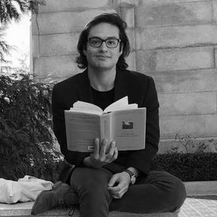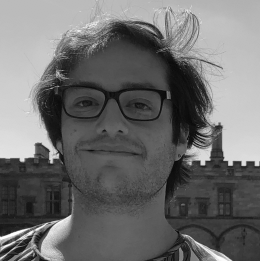As part of the Berkeley Public Theology Program, BCSR rewards promising young scholars from diverse disciplines with $5000 New Directions in Theology grants and faculty mentorship to create and shape a long-term community of inquiry on the Berkeley campus. These first- and second-year graduate students explore new directions for the study of religion in the public university through bi-weekly meetings convened by BCSR faculty.
Bernardo S. Hinojosa is a third-year PhD student in English and Medieval Studies. He participated in the 2017-2018 New Directions cohort.
“The New Directions fellowship has been one of the highlights of my time at Berkeley, as it allowed me to interact with PhD students, postdoctoral scholars, and faculty members from across the university to collaboratively explore broad theoretical questions that bridge fields that, on the surface, appear completely different, such as medieval poetry and contemporary Sri Lankan religious pluralism. What is the relationship between history and religion? Is it possible to truly understand the faith of your subject of study, whether that be someone currently alive or someone who died hundreds of years ago? Is the category of “religion” useful or even stable?
 Drawing from our own particular archives, my New Directions cohort and our faculty mentors were able to explore these topics outside of the historical, geographical, and methodological specificity that usually circumscribes humanistic research. One of my dearest intellectual interlocutors today is Kyra Sutton, one of my BCSR cohort members from the Rhetoric Department. Given that our research bookends the history of English literature — she works on the 21stcentury while I work on the 14thand 15th— it is unlikely that we would have met outside of BCSR. But our work is ultimately concerned with similar questions about the limitations and possibilities of knowing the lived experiences of others, about the relationships between temporality, writing, and belief. We will never agree on whether there is such a thing as religion (there is!), but that intense disagreement has certainly improved my writing and thinking exponentially.
Drawing from our own particular archives, my New Directions cohort and our faculty mentors were able to explore these topics outside of the historical, geographical, and methodological specificity that usually circumscribes humanistic research. One of my dearest intellectual interlocutors today is Kyra Sutton, one of my BCSR cohort members from the Rhetoric Department. Given that our research bookends the history of English literature — she works on the 21stcentury while I work on the 14thand 15th— it is unlikely that we would have met outside of BCSR. But our work is ultimately concerned with similar questions about the limitations and possibilities of knowing the lived experiences of others, about the relationships between temporality, writing, and belief. We will never agree on whether there is such a thing as religion (there is!), but that intense disagreement has certainly improved my writing and thinking exponentially.
This broadening and deepening of thought has been especially apparent as I prepare for my qualifying exams. Most of my preparation has focused on reading the canonical literature of medieval England, from the tenth to the fifteenth centuries. However, after my experience in New Directions, I am always careful to step back from their “medievalness” and think about the larger theoretical frameworks that animate these texts beyond their contextual specificity. I have also begun thinking about my dissertation project and, to that end, spent last summer conducting archival research in the Vatican, Oxford, Cambridge, and London. While it is still too early to tell, I am very interested in theorizing the relationship between the material structure of premodern books — their arrangement into quires, page layout, and even size — and how these physical features may tell us something about more abstract concepts, such as the relationship between temporality, eternity, and belief.”
#ReligionInTheWorld
The Berkeley Center for the Study of Religion (BCSR) advances creative and critical scholarship on religion in the world. bcsr.berkeley.edu | @ucbreligion

